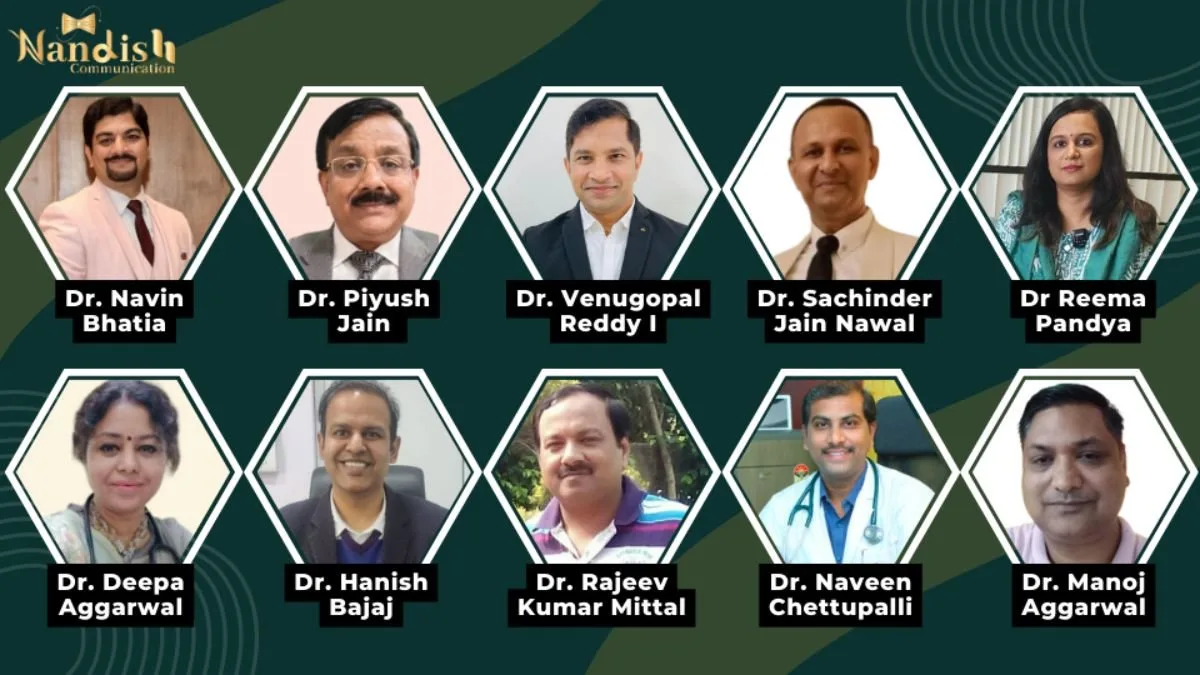Leading Paediatricians emphasise on the importance of Nutritious Diet for Children
New Delhi (India), March 01: In an era where childhood obesity and malnutrition continue to pose significant challenges to public health, the insights from leading paediatricians shed crucial light on the indispensable role of a nutritious diet in shaping the health and well-being of our children. As advocates for children’s health, paediatricians possess a wealth of knowledge and experience, grounded in both scientific research and clinical practice. In this article, we delve into the invaluable perspectives of these experts, exploring the profound impact of nutrition on children’s growth, development, and long-term health outcomes.
Dr. Venugopal Reddy I, MBBS, DCH, MD, MRCPCH, DSc, FRCPCH, FRACP, MBA, PhD – Medical Director and Consultant Pediatrician at Ovum Hospital, Bangalore
In the journey of raising healthy, happy children, a nutritious diet serves as the cornerstone of lifelong well-being. Dr. Venugopal Reddy I, Medical Director and Consultant Pediatrician at Ovum Hospital, Bangalore, emphasizes the importance of understanding and implementing such a diet for parents, caregivers, and communities. This involves incorporating a colorful array of fruits, vegetables, whole grains, lean proteins, and dairy products into children’s meals to ensure they receive essential nutrients. Good nutrition is vital for physical and cognitive development, bolstering immune function, reducing the risk of chronic diseases, and enhancing academic performance. Practical steps like offering a variety of foods, limiting processed options, and involving children in meal preparation can foster healthy eating habits early on. The long-term benefits of a nutritious diet are profound, setting the stage for improved academic achievement, emotional well-being, and overall health into adulthood. In a world often dominated by fast food and convenience, prioritizing nutrition today is an investment in the future health and happiness of our children.
Dr. Manoj Aggarwal, MBBS, DCH, MD (Paediatric) MRCPCH ( UK ) PGPN, Boston (USA) – Director of Manogeet Child Clinic, Delhi
Dr. Manoj Aggarwal at Manogeet child clinic an esteemed senior pediatrician & Neonatologist working for the welfare of the poor and needy children, renowned for his dedication to children’s health, underscores the pivotal role of a nutritious diet in shaping their well-being. Drawing from a wealth of experience, Dr. Manoj Aggarwal emphasizes that a balanced diet isn’t just essential for physical growth but also for bolstering immune function and enhancing cognitive development in children. He fervently advocates for parents to prioritize fresh, whole foods while minimizing processed and sugary options, thereby instilling healthy dietary habits early on. By promoting nutrient-dense choices like colorful fruits, vegetables, whole grains, lean proteins, and beneficial fats, Dr. Manoj Aggarwal empowers families to make informed choices for their children’s nutrition. Through his proactive guidance on dietary practices, Dr. Manoj Aggarwal, Manogeet child clinic aims to lay a robust foundation for lifelong health and vitality, ensuring that every child has the opportunity to thrive.
Dr. Sachinder Jain Nawal, MBBS, DCH, MD, Pediatric, DM (chest + Resp), International Postgraduate, Pediatric Certification, Consultant at Sunrise Hospital and Arihant Hospital, Gurugram
Dr. Sachinder Jain Nawal, a distinguished pediatrician, emphasizes the critical importance of a nutritious diet in childhood development. He underscores that a balanced diet directly impacts a child’s physical growth, cognitive function, and overall health. According to Dr. Sachinder Jain Nawal, incorporating diverse food groups such as fruits, vegetables, whole grains, lean proteins, and dairy is fundamental for providing essential nutrients like vitamins, minerals, and proteins crucial for children’s growth and development. He emphasizes the significance of setting healthy eating habits early in life to prevent chronic diseases and promote lifelong wellness. Dr. Sachinder Jain Nawal advises parents to prioritize home-cooked meals over processed foods and sugary snacks to instil healthy dietary patterns. Moreover, he stresses the significance of regular meals and snacks tailored to meet children’s nutritional needs, ensuring optimal growth, immune function, and cognitive performance. Dr. Sachinder Jain Nawal’s insights underscore the pivotal role of nutrition in fostering healthy childhood development and laying the foundation for lifelong well-being
Dr. Rajeev Kumar Mittal, MBBS, DCH (Lucknow), PGPN (Boston University) – Sanjivani Medical Center, Meerut
As a leading pediatrician, I firmly advocate for the indispensable role of a nutritious diet in children’s well-being. It’s paramount to understand that what children consume directly influences their physical growth, cognitive abilities, and overall health. I stress the importance of incorporating a variety of food groups such as fruits, vegetables, whole grains, lean proteins, and dairy into their meals. These provide vital nutrients essential for their growth and development. Establishing healthy eating habits early on is key to preventing chronic illnesses and promoting lifelong wellness. I strongly advise parents to prioritize home-cooked meals and limit processed foods and sugary snacks. Ensuring regular, balanced meals and snacks tailored to meet children’s nutritional requirements is crucial for their optimal growth, immune function, and cognitive development. By prioritizing nutrition, we can ensure our children thrive and lay the foundation for a healthy future.
Dr Piyush Jain, MBBS, DCH, Sr Pediatrician, Former President IAP, East Delhi Chairman Genesis Neurogen, Neurogen Rehab Centre for Special Needs Children like Autism and Cerebral Palsy, Delhi
As an esteemed pediatrician, Dr. Piyush Jain underscores the pivotal role of nutrition in children’s health and future success. In today’s fast-paced world, providing children with a balanced diet is essential for their growth and development. A well-rounded diet not only supplies essential nutrients for physical and cognitive development but also helps mitigate the risk of childhood obesity and related health issues by limiting processed foods and sugary snacks. Addressing macronutrient needs is crucial; protein requirements vary by age, ranging from 13 grams for toddlers to 46-52 grams for adolescents. Carbohydrates serve as an energy source, while healthy fats aid in brain function and vitamin absorption. Fiber promotes gut health and regularity. Adequate intake of vitamins and minerals like calcium, iron, and vitamins A, C, D, and E is imperative for overall health. Hydration, often overlooked, is equally important. Dr. Jain emphasizes the significance of a balanced diet in nurturing healthy, thriving children.
Dr. Naveen Chettupalli, MBBS, DNB – Paediatrics Pediatrician – Consultant Pediatrician & Managing Director at Sravani Hospital, Hyderabad
Understanding the vital role of nutrition in childhood is essential for promoting healthy growth and development in children, as emphasized by Dr. Naveen Chettupalli, a Pediatrician from Hyderabad. Nutrition impacts physical health, cognitive function, and long-term well-being, with key requirements including colorful fruits and vegetables for essential vitamins and minerals, protein and dairy for muscle and bone development, and whole grains for energy and digestive health. Common deficiencies like iron, vitamin D, and calcium can have adverse effects on children’s health, highlighting the importance of addressing nutritional needs early on. A nutritious diet supports healthy weight, growth, and immunity, while enhancing focus, memory, and emotional well-being. Strategies such as cooking workshops, visual presentations, and positive reinforcement of healthy eating habits are crucial for promoting lifelong nutritious eating habits. The long-term benefits encompass physical and mental development, enhanced cognitive function, reduced risk of cardiovascular diseases, and improved emotional well-being, underlining the significance of prioritizing nutrition in childhood and beyond.
Dr Reema Pandya, MD (Pediatrics), PGD (Infectious Diseases) – Little Stars Paediatric Clinic, Ahmedabad
No generation of parents have previously faced so much trouble incorporating good eating in kids than the current generation of parents. The easy availability of junk food, lack of time in preparing home-cooked food, zero awareness about the importance of family pot, increased usage of frozen food, fast food disguised as “healthy”, soft drinks marketed as “energy drinks”, increased consumerism in form of 2+2 free pizza are just a few of the causes which have led to an epidemic of malnourishment. Kids fall sick so often that their growth is affected & later on over overeat so much that they become obese and start having lifestyle disorders, early puberty & hormone problems. Saying no to packed food, limiting eating at restaurants to once in 15 days, at least 60 minutes of outdoor play, bringing back millet to our plates, including “rainbow” colors in our food, identifying unknown sources of sugar & excess salt are a few steps every parent should take. Parents themselves should eat healthy food as in the end it’s all about monkey see, monkey do.
Dr. Deepa Aggarwal (MBBS, MD, DNB) Senior Consultant Paediatrician, Head – Department of Pediatrics & Neonatology Department at Mayom Hospital, Gurgaon
A nutritious balanced diet is crucial for a child’s well-being, supporting a strong immune system, healthy weight maintenance, and establishing lifelong habits for a healthier future. This dietary approach plays a pivotal role in preventing obesity, diabetes, hypertension, and various hormonal disorders as children grow. Parents, as primary caregivers, play a key role in ensuring their child’s nutritional needs are met effectively. Starting weaning at 6 months with diverse homemade meals and transitioning to family foods by 8-9 months fosters healthy eating habits. It’s important to avoid regular consumption of packaged foods like juices, cereals, biscuits, cakes, and chips, as well as unnecessary supplements like milk protein powders, which can suppress a child’s appetite for nutritious meals. Embracing our ROOTS by including traditional and diverse home-cooked meals is essential for nurturing our children’s future health.
Dr. Hanish Bajaj, M.B.B.S. DCH, Pediatrician, Child Specialist – Director Silver Crest Hospital, Director Narayana Mother and Child Care Center, Director HCW Foundation, Gurgaon
Dr. Hanish Bajaj, a Pediatrician and Child Specialist in Gurgaon, sheds light on the common issue of childhood constipation, characterized by difficulty passing stool, leading to infrequent or hard, dry stools. Causes include low fibre intake, dehydration, withholding bowel movements, dietary changes, and certain medications. Symptoms encompass infrequent bowel movements, hard stools, discomfort, abdominal pain, loss of appetite, mood changes, and soiling. Preventive measures involve promoting a high-fibre diet, adequate fluid intake, establishing a regular toilet routine, encouraging physical activity, teaching proper toilet techniques, and addressing psychological factors if present. Dr. Bajaj stresses the importance of seeking medical advice for persistent constipation, as it may require intervention such as medication or specialist referral. Consulting healthcare professionals ensures effective management and the overall well-being of children.
Dr. Navin Bhatia (M.B.B.S, DCH, DNB Pediatrics and Fellowship in Intensive care and Diabetes mellitus.) Pediatric Intensivist and Associate Pediatrician, Max Hospital Gurgaon and Director The Fertilife and Dr. Navin Bhatia’s Pediatric Clinic at DLF Phase 4, Gurgaon
A nutritious diet is essential for children’s growth, development, and overall health like a foundation of a building. A nutritious diet must include vitamins, minerals, protein, carbohydrates, and fats, crucial for their physical and cognitive development. A balanced diet supports healthy growth, strengthens the immune system, improves concentration and focus, and helps maintain a healthy weight. Common diet-related problems in children are Constipation, malnutrition, overweight and obesity. It also reduces the risk of chronic diseases later in life like Diabetes, hypertension and lipid disorders. Nutritious foods aid in building strong bones and teeth, promoting healthy skin, hair, and nails. Moreover, they foster the development of good eating habits that can last a lifetime. Parents and caregivers play a critical role in ensuring children have access to a variety of nutritious with the partnership of a Pediatrician. By prioritizing a balanced diet, children can thrive and reach their full potential.
If you have any objection to this press release content, kindly contact [email protected] to notify us. We will respond and rectify the situation in the next 24 hours.
- डिप्टी सीएम केशव प्रसाद मोर्य का आगरा से भाजपा प्रत्याशी एसपी सिंह बघेल के लिए रोड शो, उमड़ पड़े लोग, जय श्रीराम के नारे - May 5, 2024
- लोकसभा चुनाव 2024: थमा तीसरे चरण के लिए प्रचार का शोर, यूपी की इन सीटों पर होगी 7 मई को वोटिंग - May 5, 2024
- इंडियन नेवी ने अग्निवीर SSR-MR भर्ती के लिए जारी की अधिसूचना - May 5, 2024




